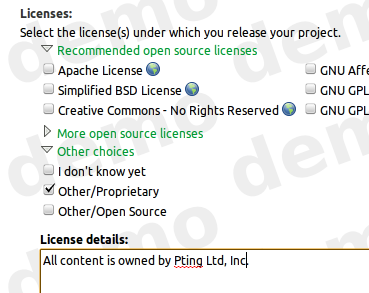Setting up commercial projects quickly
Setting up a commercial project in Launchpad has gotten easier. You can now quickly register a proprietary project and enable private bugs. You can create private teams and private personal package archives, AKA private PPA or P3A without the assistance of a Launchpad admin.
When you select the Other/Proprietary license while registering a project, or changing the project’s details,

it is given a complimentary 30-day commercial subscription.

The delay between the moment when a commercial project was registered and when the commercial subscription was purchased and then applied to the project caused a lot of confusion. During this delay, proprietary data could be disclosed. We chose to award the project with a short term commercial subscription which enabled the project to be properly configured while the 12-month commercial subscription was being purchased and applied to the project.
Any project with a commercial subscription can enable
- Default private bugs
- Once enabled by configuring the project’s bug tracker, all new reported bugs are private. You can choose to make the report public.

- Default private branches
- You can request a Launchpad admin to configure private branches for your teams. (You will be able to do this yourself in the near future when projects gain proprietary branches.)
As the maintainer of a project with a commercial subscription, you can register
- Private teams
- When you register a team, you can choose to set the team visibility to private. The team’s members and data is hidden from non-members.

- Private mailing lists
- When you create a mailing list for a private team, the archive is also private. Only team members may see the messages in the archive.

- Private PPAs
- When you create a PPA for your public team, you may choose to make it private; private teams can only have private PPAs. You can subscribe users to your archive so that they may install packages without revealing all your team’s members and data to the subscriber.

A secondary benefit of this change is that you can now try Launchpad’s commercial features before purchasing a 12-month commercial subscription. The features will be disabled at the end of 30-days. Your test data will remain private to ensure your data is not disclosed.
Any open source project may also have a commercial subscription to enable commercial features. You can purchase a commercial subscription at the Canonical store. Commercial subscriptions cost US$250/year/project + applicable V.A.T.
(Photo by Fred Dawson on flickr, creative commons license)
Tags: commercial, front-page, mailing-lists, PPA, projects, teams




April 18th, 2012 at 7:34 pm
I can’t seem to find a way to navigate to the commercial subscription purchase page via the store navigation menu. Its not listed under software or training or Ubuntu advantage.
Nor does entering “launchpad” into the search box in the store website find the url.
Other than this blog entry.. I have no idea how to actually find the purchase url. That’s probably something that should be addressed in the store-front and in the Launchpad frontpage/search as well.
April 18th, 2012 at 8:22 pm
A decision was made years ago to hide the Launchpad Commercial Subscription in the Canonical store. I too cannot find it. The project page shows the link to purchase the subscription when after you add the “Other/Proprietary” licenses. Launchpad search is really Google’s search, and since the GoogleBot does not maintain any commercial projects, it cannot see the pages that link to the store.
Launchpad’s Commercial features were created for Canonical and its partners, so there wasn’t much incentive to make them easy to find or use 🙁 The changes described in the post were made in part because the store and the middleware to track the purchase are out of our control. I changed Launchpad’s rules to permit any project to have a commercial subscription a few weeks ago. I also published the store link at https://help.launchpad.net/CommercialHosting so that maintainers with open source projects have a chance to purchase a commercial subscription.
We will consider promoting Launchpad’s commercial features after we add support for private projects, which is the feature most often requested by Canonical and it commercial users. Since users cannot create private branches without the assistance of a Launchpad admins, I think promoting these features will lead tremendous frustration. Once users can manage what is proprietary and choose who to disclose it to, we can choose to promote Launchpad’s commercial features.
April 19th, 2012 at 5:45 am
Wishing that “commercial” and “proprietary” weren’t used interchangeably (and yes, I’ll take my lumps too 🙂 ). All open source is commercial, or at least has the potential to be, while remaining open source. Meanwhile, no open source is proprietary. And just to complete the loop, not all proprietary is commercial. So “commercial” and “proprietary” really are orthogonal, and what this feature is about is “proprietary”.
Terminology aside, I’m glad it’s gotten easier to put proprietary projects on Launchpad, as there’s nothing else quite like it! Nice development.
-K
April 19th, 2012 at 12:49 pm
Hi Karl.
Up until a few weeks ago. Launchpad really believed proprietary == commercial. There is still a lot of text and code that needs to change so that it is clear that any open source project can enable commercial features.